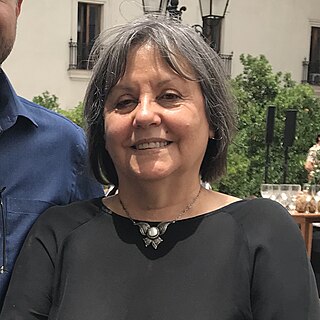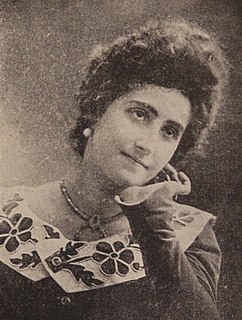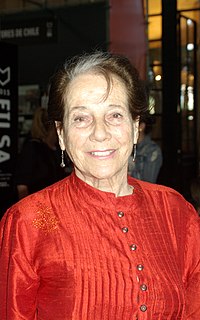
Diamela Eltit is a Chilean writer and university professor. She is a recipient of the National Prize for Literature.
Ediciones Ekare is a Venezuelan based children's book Publisher. Ekaré began in 1978 in Caracas, Venezuela and its initial goal was to publish books which reflected the Venezuelan and Latin American culture and landscape. This was directly related to the experience in public and school libraries of the Banco del Libro, a non-profit organization which promotes reading and books. The catalog includes original works as well as translations of publications in other languages.

Jorge Félix Arrate Mac Niven is a Chilean lawyer, economist, writer and politician. He has been Minister of State in the governments of Chilean presidents Salvador Allende (1970–1973), Patricio Aylwin (1990–1994), and Eduardo Frei Ruiz-Tagle (1994–2000). A long-time member of the Socialist Party of Chile arrate was during much of the 1990s the leader of the eponymous Arratismo faction in the party. During the indictment and arrest of Augusto Pinochet (1998–2000) Arrate was positive to the prospect of Pinochet being judged abroad. Given that his was contrary to the government stance he was removed from his post as minister in June 1999. In 2009, he was appointed as candidate for president of Chile in representation of the political alliance Juntos Podemos Más and other leftist political movements, obtaining 6.21 percent of the total votes in the elections of that year.

The Revolution of 1851 was an attempt by Chilean liberals to overthrow the conservative government of president Manuel Montt and repeal the Chilean Constitution of 1833. After various battles and sieges, by late December 1851 government forces had subdued the revolutionaries.
In Chilean historiography, Colonial Chile is the period from 1600 to 1810, beginning with the Destruction of the Seven Cities and ending with the onset of the Chilean War of Independence. During this time, the Chilean heartland was ruled by Captaincy General of Chile. The period was characterized by a lengthy conflict between Spaniards and native Mapuches known as the Arauco War. Colonial society was divided in distinct groups including Peninsulars, Criollos, Mestizos, Indians and Black people.
Alicia Galaz Vivar was a Chilean poet and literary researcher. She was the founder and director of the poetry magazine Tebaida.

Delia Ducoing, better known as Delia Ducoing de Arrate or Isabel Morel (1885-?), was a Chilean writer, journalist, editor and feminist activist. She was best known for her work on behalf of women's rights in the political, social and civil sphere in Chile since 1914. On October 26, 1927, she founded the Women's Union of Chile in the city of Valparaíso with Gabriela Mandujano and Aurora Argomedo, assuming its presidency on May 6, 1928. As a writer, one of her best known works is the book Charlas femeninas (1930), one of the first publications which systematized feminist thought in Chile. She also wrote and edited the magazine Nosotras in the early 1930s.

María Julieta Kirkwood Bañados was a Chilean sociologist, political scientist, university professor and feminist activist. She is considered one of the founders and impellers of the Chilean feminist movement in the 1980s. She is considered the forerunner of Gender studies in Chile.

Monica Echeverría Yáñez was a Chilean journalist, writer, actress and a Literature professor. She defined herself as a feminist since "before people called it that" and called herself a "rebel" and "anarchist" in the face of the neoliberal economic course of the Chilean government.

Olga Viktorovna Ulianova Ольга Викторовна Ульянова was a Russian historian, born in the Soviet Union, naturalized Chilean. She specialized in contemporary history, Cold War, Chilean communism and the international non-state networks.
Stella Corvalán Vega was a Chilean writer and poet. She mainly explored the genre of poetry ascribing itself to an aesthetic stance close to surrealism. She is included together with Homero Arce, María Elvira Piwonka, Mila Oyarzún, and others in the group of writers known as the Generation of '38.

Eliana Navarro Barahona was a Chilean poet. Her poetry was praised from an early date by literary critic Hernán Díaz Arrieta. Her poetry has been studied in various Chilean and foreign universities and her work appears in many national and foreign anthologies.
Enriqueta Peptitpas Cotton, better known as Henriette Morvan or Damita Duende, was a Chilean journalist, writer, and editor. Associated with the genres of children's and young adult literature, she wrote and compiled related stories.
Irene Bluthenthal Geis is a Chilean journalist, writer, editor, and former television presenter, best known for hosting the program Emisión Cero on Canal 9 during the 1960s, and Contrapunto and Aire Libre in the early 1970s on the same channel.
Marta Villanueva Cárdenas, known by her pseudonyms Luz de Viana and Marta Villanueva, was a Chilean writer and painter. She specialized in novels and short stories.
Guadalupe Santa Cruz, also known as Lupe Santa Cruz, was an American writer, philosopher, visual artist and translator. She is considered one of the most energetic and varied protagonists of a generation of writers that emerged after the period of the 1973 Coup d'État in Chile. Author of numerous books, including Plasma, with which she received two important prizes in Chile: the Premio Novela Inédita Consejo Nacional del Libro y la Lectura and the Premio atenea. Also, in 2004, Plasma received the prize of the Book Council as a novel in the unpublished category. In addition, at the international level, she received the John Simon Guggenheim Foundation fellowship in 1998.
Sonia Cristina Montecino Aguirre is a Chilean writer and anthropologist. In 2013, she was awarded the Premio Nacional de Humanidades y Ciencias Sociales

Elvira Hernández is a Chilean poet, essayist, and literary critic.

Celinda Arregui de Rodicio was a Chilean feminist politician, writer, teacher and suffrage activist best known for her work in favor of the rights of women in the political, social and civil spheres in Chile.
Ivonne Coñuecar is a Mapuche writer, poet and journalist from Coyhaique, Chile.










